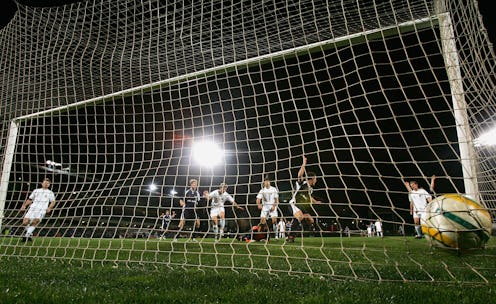News
Women In Saudi Arabia Can Watch Soccer Games In Public Now — But There's A Catch

On Friday, for the first time ever, women in Saudi Arabia watched a soccer game at a stadium in public. Mohammed bin Salman, the country's 32-year-old crown prince, announced a sweeping set of reforms in October aimed at modernizing the ultraconservative Islamic theocracy, and allowing women to attend public sporting events was one of those reforms.
But there was a catch: Women who attended Friday's match at King Abdullah Sport City stadium in Jeddah were forced to sit in "family sections," separate from male attendees. Other facilities in the stadium, such as bathrooms and prayer rooms, were also segregated by gender.
Nevertheless, three major stadiums in the country that were previously male-only will all be open to women by Thursday, a progressive move for a country with a long history of relegating women to second-class citizens.
Under law, Saudi women are not allowed to marry, divorce, travel, get a job or have elective surgery without permission from a male guardian; depending on the circumstances, that guardian might be their father, husband or son. They also may not go out in public without covering most of their bodies or retain custody of children older than nine after a divorce. According to the Telegraph, the court testimony of a Saudi women is only worth half of a man's testimony, and a woman whose parent dies can only receive half the inheritance as her brothers.
In a 2016 report comparing gender equality around the world, the World Economic Forum ranked Saudi Arabia 141th out of 144 countries, with only Syria, Yemen and Pakistan scoring worse with regard to women's rights.
In recent years, however, the country has taken steps, albeit small ones, to integrate women more equally into Saudi society. Saudi women were allowed to vote for the first time ever in the country's 2015 municipal elections, which were also the first elections in which women were elected to office in Saudi Arabia. The government announced in September that it would be lifting its longstanding ban on female drivers in June, and in 2016, the powers of the country's notoriously draconian religious police were significantly curtailed.
In an October interview with the Guardian, Salman harshly criticized the country's ultraconservative laws, and announced that he would soon be taking steps to moderate them. As crown prince, Salman is the second most powerful official in the country behind the king and the designated successor to the throne.
“What happened in the last 30 years is not Saudi Arabia," said Salman, referring to the rightward shift the country has taken over the last several decades. "What happened in the region in the last 30 years is not the Middle East. After the Iranian revolution in 1979, people wanted to copy this model in different countries, one of them is Saudi Arabia. We didn’t know how to deal with it. And the problem spread all over the world. Now is the time to get rid of it.”
Soccer is a very popular sport in Saudi Arabia, and opening the doors of Saudi soccer stadiums to women is a part of Salman's reform. Until Friday, all stadiums in the country were restricted to men, forcing female soccer fans to watch games on television. Some women attempted to sneak into stadiums in defiance of the ban, often resulting in their arrest by Saudi authorities.
During and after Friday's match, pictures of videos of women in the stadium flooded social media, sometimes with the Arabic-language hashtags #FamiliesEnteringStadiums and #ThePeopleWelcomeWomenEnteringStadiums, according to the New York Times. CBS News reports that the stadium was also fitted with smoking rooms, restrooms and prayer areas for female attendees.
The Jeddah stadium was the first to lift its ban on female attendees. On Saturday, the national stadium in Riyadh will follow suit, and another one in Dammam will do the same on Thursday.
Friday's match in Jeddah was between Al-Ahli and Al-Batin, two local teams. Al-Ahli won in a 5-0 route.